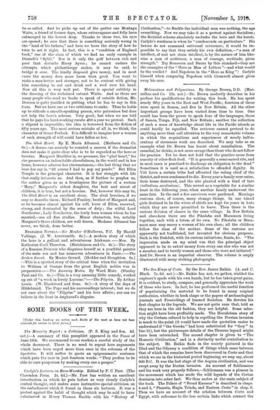Carlyle's Lectures on Hero - Worship. Edited by P. C. Parr. (The
Clarendon Press. 23. 6d.)—Mr. Parr has written an excellent introduction in which he puts before us very clearly Carlyle's central thought, and makes some instructive special criticism on the embodiment which it found in these six lectures. It was a protest against the habit of thought which may be said to have culminated in Henry Thomas Buckle with his "History of Civilisation,"—to Buckle the individual man was nothing, the age everything. Now we may take it as a protest against Socialism ; the Socialist scheme absolutely excludes the hero and the heroic. Carlyle's weakness is when he "condescends on particulars." His heroes do not command universal reverence; it would be im- possible to say that they satisfy his own definition,—" a man of intellect, of real not sham intellect, is by the nature of him like- wise a man of nobleness, a man of courage, rectitude, pious strength." Try Rousseau and Burns by this standard—they are the examples of the "Hero as Man of Letters "—and what would be the verdict ? And Napoleon in the "Hero as King" ! Carlyle himself when comparing Napoleon with Cromwell almost gives away his case.


































































 Previous page
Previous page